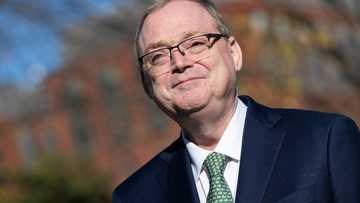
AFP
20233 articles published since 08 Mar 2022

20233 articles published since 08 Mar 2022







Faberge's The Winter Egg, considered one of his most beautiful creations, sold for nearly £23 million ($30 million) at auction Tuesday in London, smashing the sales record for the legendary jeweller of Imperial Russia.

Amazon Web Services launched its in-house-built Trainium3 AI chip on Tuesday, marking a significant push to compete with Nvidia in the lucrative market for artificial intelligence computing power.

Italian fashion group Prada announced on Tuesday it had completed its acquisition of smaller rival Versace, announced earlier this year for 1.25 billion euros (now $1.45 billion). Versace's lustre had been waning in recent years, unlike that of the Prada Group, which is in robust health, fuelled by strong sales of its younger Miu Miu Line.

Germany's economy is suffering its "deepest crisis" since the aftermath of World War II, an industry group warned Tuesday, calling on Chancellor Friedrich Merz's government to take urgent action to spark a revival.

The world economy has been "surprisingly resilient" in the face of adversity this year, the OECD said Tuesday, raising its growth estimates for key economies, notably the US and the eurozone. "The global economy has shown surprising resilience in 2025," the OECD said.

South Korea's president ordered on Tuesday swift action to penalise those responsible for a major data leak at e-commerce giant Coupang affecting more than 33 million customers. The case follows a major breach at South Korea's largest mobile carrier SK Telecom, which was fined about 134 billion won ($91 million) in August after a cyberattack exposed data on nearly 27 million users.

Samsung launched its first triple-folding phone on Tuesday, a special-edition product with an eyewatering price tag placing it out of the reach of the average consumer. The triple fold function is not world-first -- China's Huawei beat Samsung to the punch last year with a phone at a similarly exorbitant price.

Apple on Monday said the head of its artificial intelligence team is stepping down, and the effort is to be led by a veteran engineer from Google and Microsoft. Subramanya was most recently a corporate vice president of AI at Microsoft, prior to that spending 16 years at Google where he was head of engineering for the Gemini digital assistant before leaving, Apple said.

Stocks rose Tuesday following the previous day's stutter as more weak US data helped solidify US interest rate cut optimism and tempered nervousness over rising Japanese bond yields. The remarks boosted the yen and provided a jolt to equities as the yield of Japanese two-year government bonds rose past one percent to their highest since 2008 during the global financial crisis.
AFP
Load more